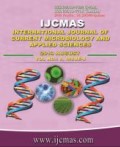


 National Academy of Agricultural Sciences (NAAS)
National Academy of Agricultural Sciences (NAAS)

|
PRINT ISSN : 2319-7692
Online ISSN : 2319-7706 Issues : 12 per year Publisher : Excellent Publishers Email : editorijcmas@gmail.com / submit@ijcmas.com Editor-in-chief: Dr.M.Prakash Index Copernicus ICV 2018: 95.39 NAAS RATING 2020: 5.38 |
The present investigation was carried out to generate information on variability for quantitative and quality traits in okra [Abelmoschus esculentus (L.) Moench]. The experiment material consisted of 30 genotypes of okra that were evaluated in Randomized Complete Block Design (RCBD) during summer-rainy season, 2018. The observations were recorded on days to 50 per cent flowering, node at which the first pod set, plant height (cm), nodes per plant, internodal length (cm), days to marketable maturity, pod length (cm), pod diameter (cm), ridges per pod, average pod weight (g), pod yield per plant (g), pods per plant, duration of availability of edible pods, dry matter (%), mucilage (%), immature pod colour and pod pubescence. Significant differences were observed among the genotypes for all the traits, indicated presence of sufficient variation. Among all, genotypes 9801, Kashi Vibhuti, DPO-5, Palam Komal and Punjab Suhawani were the highest yielders and these were also among the top genotypes for economic traits viz., nodes per plant, internodal length, days to marketable maturity, duration of availability of edible pods and pods per plant. The PCV was invariably higher than their corresponding GCV for most of the characters, indicated close association between phenotype and genotype. High to moderate PCV as well as GCV was observed for mucilage followed by pods per plant, pod yield per plant, average pod weight, ridges per pod, node at which the first pod set, nodes per plant, plant height and internodal length depicting the presence of substantial variability and would respond better to selection. High heritability along with high genetic advance was observed for ridges per pod, mucilage and pod yield per plant, respectively revealing the importance of additive gene action for the inheritance of these traits, and further improvement could be done through phenotypic selection.
 |
 |
 |
 |
 |